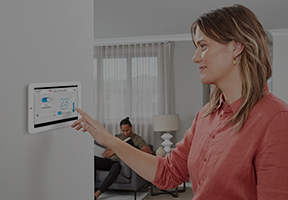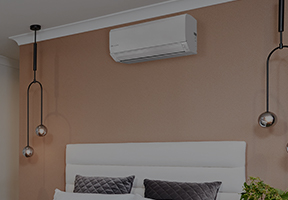What is the Optimum Air Conditioner Temperature?
The recommended air conditioning temperature is generally between 25-27°C for cooling and 18–21°C for heating. These ranges keep your home comfortable while ensuring your system runs efficiently without unnecessary energy use.
The perfect temperature for an air conditioner can contribute significantly to performance and power consumption. For example:
Mild weather: Use fan-only or auto mode to maintain airflow without heavy energy demand.
Night-time: Slightly adjust your settings up in summer or down in winter for comfort while you sleep.
Energy efficiency: Avoid setting the air conditioner to extremes (very cold in the summer or overly warm in the winter), as this puts extra strain on the system and increases running costs.
With Fujitsu’s advanced climate control technologies, you can make effective use of temperature settings throughout the year. Many models also support optional smart air conditioning, allowing you to fine-tune modes and temperatures remotely for maximum comfort and efficiency.
What Air Conditioner Temperature is Best in Australia?
The best temp for aircon in Australia is around 25-27°C in summer and 18–23°C in winter. These ranges deliver both comfort and energy efficiency, and are particularly suited to Australia’s climate, where summers are hotter and winters generally milder than in many Western countries. Learn more about the optimum summer setting for an air conditioner and the recommended AC setting in winter.
Australia’s climate extremes mean running an air conditioner year-round is common. Higher summer settings reduce strain on your system while still keeping you cool, while slightly warmer winter temperatures maintain comfort without excess energy consumption. These recommended ranges help Australian households stay efficient and cost-effective.
What Air Conditioner Temperature is Best for Energy Saving
The temperature you set your air conditioner on can have a big impact on both performance and energy usage. Keeping your settings within a moderate range helps the system run smoothly without unnecessary strain. For most homes, the best air conditioner temperature for energy saving keeps you comfortable without being set too high in winter or too low in summer, helping to save energy while maintaining performance.
For more ways to reduce running costs, check out our range of energy efficient air conditioners.
Quick tips for energy saving:
Use ceiling fans to help circulate cooled or heated air.
Set timers so the system runs only when needed.
Keep doors and windows closed while the air conditioner is on.
Close blinds or curtains to reduce heat transfer.
Regularly clean filters to maintain efficiency.
Other Air Conditioning Temperature Setting Factors for Energy Saving
While the above recommendation covers the general use of residential air conditioners, there may be other factors to consider when deciding on the ideal air conditioner temperature settings.
Humidity Levels
High relative humidity can make the air feel warmer. Lowering your air conditioner setting helps remove moisture, or you can switch to ‘dry mode’ for milder days. So, what temperature should your house be? Learn more about the best AC setting for humid climates.
Occupancy
If your home is empty for long periods, set the temperature higher during summer and lower during winter or switch the unit off. Programmable timers can automate this to match your schedule.
Time of Day
Adjusting your air conditioning temperature setting for energy saving throughout the day can help reduce power use. For example, at night, you may be able to increase the indoor temperature during summer or lower it during winter without compromising comfort.
Finding the ideal aircon temp comes down to balancing comfort without wasting energy. By following seasonal guidelines and making small adjustments for different times of day or weather conditions, you can reduce running costs without sacrificing comfort. With Fujitsu’s energy-efficient air conditioners, it’s easier to enjoy a comfortable home while keeping your energy use under control.







